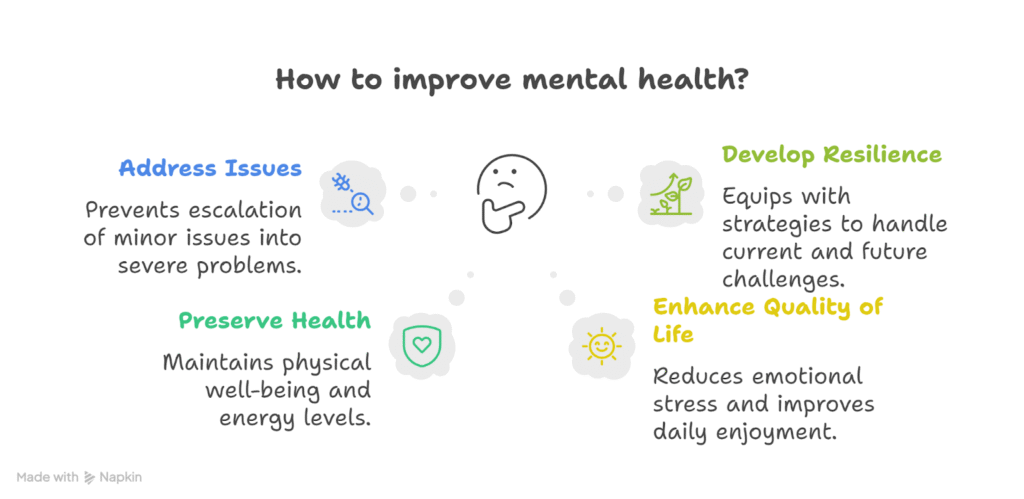Everybody has stressful, depressing, or anxious moments, but when they persist or get worse, they can start to interfere with day-to-day functioning. Persistent worry, negative self-talk, or even hopelessness that you can’t seem to get rid of are all examples of unwanted thoughts and feelings.
Although it’s normal to question whether your problems are “serious enough” to warrant seeking assistance, speaking with a mental health expert can have a significant impact long before obstacles become too much to handle.
The warning signs, the advantages of early intervention, and how to determine when it’s time to take that crucial step toward assistance and recovery are all covered in this guide.
What Are Unwelcome Thoughts and Emotions?
Intruding images or ideas that you can’t ignore, constant concern, profound grief, numbness, or overwhelming guilt or shame that doesn’t seem to go away are examples of unwanted thoughts and feelings. They aren’t always spectacular or extreme; they can also manifest as a silent, ongoing drain, such as feeling distant from the people you care about, waking up nervous for no apparent reason, or repeatedly repeating a mistake.
It’s critical to keep in mind that having occasional bad emotions is a natural component of being human. It’s common to have anxiety before a huge shift, grief after a loss, or stress before a job interview.
Why People Hesitate to Seek Help
Many people put off seeking assistance because they feel ashamed, afraid of being judged, or think their issue isn’t “serious enough.” You may convince yourself that you can handle things on your own or fear that treatment will stigmatize you. Access, time, and expense are examples of practical obstacles.
The comforting reality is that asking for assistance is a sign of clarity rather than weakness. Getting mental health care is like going to the doctor for a chronic cough. In many cases, problems are easier to treat the earlier they are addressed.
The next section outlines the specific warning signs that indicate it’s time to consult a professional, so if you’re unsure whether to get in touch, keep reading.
Signs It May Be Time to Talk to a Mental Health Professional
- Your feelings seem excessively intense or persistent:
Anger, irritability, depression, or worry that doesn’t go away with time or relaxation and persists for weeks (more than two weeks) is a warning sign. You can’t “tough out” persistently overwhelming emotions.
- Repetitive or upsetting ideas are undesirable:
This includes uncontrollable intrusive thoughts, such as visions, uncertainties, or anxieties that arise and cause you distress. It’s time to get help if they cause you to feel ashamed, interfere with your ability to concentrate, or disturb your sleep.
- Everyday life begins to suffer:
Professional support can assist in reestablishing equilibrium when mental or emotional challenges make it more difficult to concentrate at work, fulfill obligations, or preserve relationships. A persistent drop in performance or social disengagement is cause for concern.
- You feel despair or consider harming yourself:
If unwelcome ideas involve self-harm or a deep sense of hopelessness, it’s imperative to seek help immediately. These crises are urgent signs that you need care, and professionals are equipped to help you through them.
- You’re no longer motivated or interested:
Physical symptoms are frequently a sign of mental health problems. Prolonged emotional stress may manifest as sleep problems, exhaustion, changes in appetite, frequent headaches, or unexplained symptoms.
- Your feelings seem very strong or persistent:
It can be more than just a brief dip if unwanted thoughts or feelings persist for longer than 1.5 weeks without alleviation. Anxiety, irritation, or persistent depression that doesn’t go away on its own is a clear indication that you need professional help.
- You’re staying away from People & events:
Avoidance is a typical coping mechanism that can easily become restrictive. A therapist can assist you in addressing the underlying cause if you find yourself avoiding relationships, work-related activities, or events in order to cope with worry or unwelcome thoughts.
What Happens When You Talk to a Mental Health Professional

The first step in speaking with a mental health professional is typically to have a talk in a private, secure setting about your experiences and how they have affected you.
Before seeking help, many people wait until they are completely overwhelmed, despite the fact that early intervention is one of the best things you can do for your mental health. So depressing!
Early intervention for unwanted thoughts and feelings can:
- Avoid the intensity or seriousness of something bad such as conflict or tension: Ignoring minor issues might lead to more severe mental health issues.
- Preserve general health: The immune system, energy levels, and physical health are all impacted by mental health.
- Enhance quality of life: Receiving help early on frees you from ongoing emotional stress so you may enjoy relationships, your job, and everyday activities.
- Develop resilience: Counseling and therapy offer strategies and resources that help you deal with present issues while also becoming ready for new ones.
Advantages of Consulting a Mental Health Expert
Although speaking with a mental health professional can seem like a major step, there are many advantages that go beyond simply feeling better.
- Understanding Your Symptoms
First of all, you can gain crucial insight into your mental health symptoms by consulting with a mental health counselor. You probably know you’re experiencing a mental health issue if you’ve been feeling unwell and finding it difficult to interact with others.
You may not be fully aware of what is happening, though. You can get more information about your symptoms by speaking with a mental health counselor.
This can occasionally result in a useful diagnosis, and other times it can help you better understand your feelings and how to deal with them. Regardless of the severity or duration of your mental health crisis, being clear about what happened will help you identify
- Better Interaction
Second, you will be able to communicate your mental health condition to others more effectively if you consult with a mental health counselor.
Regular sessions with a mental health counselor will help you get used to discussing your emotions, symptoms, and challenges in a more relaxed and targeted manner.This will thus make it easier for you to discuss your mental health with individuals in your immediate vicinity.
This is crucial because your closest friends and family members are frequently the ones who can support you during your darkest hours. But they won’t know how to support you if you never let them know what you’re going through.

- Increase hope & Confidence
You can feel more optimistic about your mental health by scheduling a consultation with a mental health counselor. It can be hard to think that you’ll ever feel better while you’re experiencing a mental health crisis.
You may believe that your anxiety or depression symptoms will never go away.However, you will discover how to fight your symptoms and achieve healing once you begin seeing a mental health specialist. You’ll begin to see the future with greater optimism.
How to Take the First Step
Being willing is all that is needed to take that initial step; perfection is not. Write down your observations, including symptoms, duration, and instances of how they affect your life. Your initial appointment will be more targeted if you have this journal or symptom list.
Ask your primary care physician for a recommendation, look out registered therapists online (verify their qualifications and areas of expertise), look into telemedicine platforms for more flexible possibilities, or get in touch with community mental health facilities. To gain a sense of fit and style, many therapists provide brief phone sessions.
Inquire about sliding-scale pricing, insurance coverage, or local resources if money is an issue. Keep in mind that early support frequently speeds up recovery, so you don’t need to wait until things get worse. And once more, contact emergency services or your local crisis hotline right away if you ever feel uncomfortable or overwhelmed by thoughts of harming yourself.
Conclusion
Unwanted feelings and thoughts are a natural part of being human, but when they persist, get worse, or start to get in the way of your life, it’s obvious that getting expert help could help. Early support can help you develop better coping mechanisms, stop minor issues from getting worse, and eventually enhance your relationships and general well-being.
It’s not necessary to wait until things become intolerable before acting. Speaking with a mental health professional is a step toward recovery, resiliency, and leading a more complete, well-rounded life—it is not a show of weakness.
